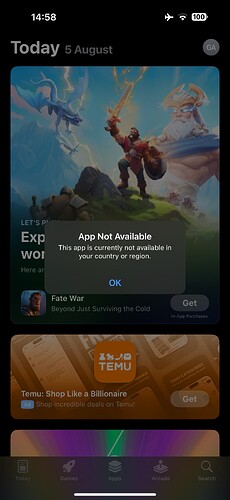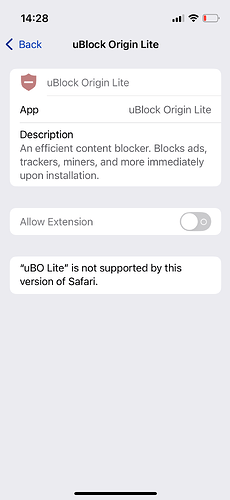How to install this on iOS? I don’t see it on the App Store.
It might not be available in the store yet as it’s still in beta, but it is now approved (notarised) by Apple.
Edit: I have no idea whether all Safari extensions are also available on iOS
Sorry, that’s likely false since even uBOL filters are converted to content blockers rules.
It’s still being reviewed by Apple, but it will get posted on testflight first.
I actually believe we shouldn’t remove AdGuard recommendation. In fact, IMO we should even recommend it as a MV3 extension for Chromium browsers.
The reason is AdGuard is much more powerful than Ublock Origin Lite (ubol). For example, in Addguard you can add your own cosmetic/procedural rules (at least on Chromium), while ubol doesn’t allow you to (it might be added in the future).
Also, Adguard will allow you to add custom lists in their next big release (this will necessitate enabling Chrome dev mode though).
Ublock lite is out on TestFlight for Safari if anyone wants to give it a try. I tried it out. It still needs some work. I’ll stick with Adguard for now.
One major difference between uBOL and AdGuard is that AdGuard is using the native content blockers function in Safari in addition to an extension, while uBOL is only an extension.
This is major because extensions on iOS do not run in PWAs or web previews but content blockers do (on MacOS extensions do run in PWAs).
So if only using uBOL on iOS, there are no content blocking capabilities in PWAs. This would go against the usual recommendation to use PWAs over native apps for privacy.
Isn’t “Adguard for Safari” an exension? I am a bit confused here.
There are two ways an app can go about blocking content in Safari.
One way is through using the native “content blockers” app extension built into Safari. These are the classic rules lists that can block cookies, loading certain things, and can hide elements from the page. Content blockers cannot see anything on a webpage or report anything back to its app. Content blockers predated Safari supporting extensions.
Extensions are more robust and can do
more things like view the contents of a webpage and run code. These can be enabled on a per site basis. Extensions can interface with its app.
Examples of extension functionality that is not possible with content blockers include a password manager inserting a drop down account selector on login screens and blocking ads on YouTube.
Extensions and content blockers run in all Safari windows on MacOS. In Safari on iOS, extensions only run in the main app and no not run in PWAs or web views. Content blockers do run in PWAs and web views.
AdGuard for Safari uses both content blockers and an extension. The content blockers are used for the usual blocklists and the extension is used for more complex blocking. Here is the info from AdGuard on the difference.
uBOL only uses the extension function so its blocking capabilities are limited in PWAs on iOS.
Not sure. I heard that AdGuard for iOS is MV2 but couldn’t confirm it myself.
This is off-topic and has already been discussed Proposal: Remove uBlock Origin and update criteria for browser extensions
The extension is out now on the App Store:
https://apps.apple.com/app/ublock-origin-lite/id6745342698
I think now we can remove the waiting tag and start moving forward with this what do y’all think @team
Is this still an issue? It seems like it’d be a blocker or at least worth a warning if uBOL is listed.
We should probably wait until we see it getting regular updates before recommending it.
The way I understand how it works is that the block lists require the application to be regularly updated for it to stay up to date.
That’s a good point. I can’t imagine the app wouldn’t be updated regularly, but best to wait and see. I pulled this from the uBOL Q&A:
There are no filter lists proper in uBOL. There are declarative rulesets and scripts which are the results of compiling filter lists when the extension package is generated. Those declarative rulesets and scripts are updated only when the extension itself updates. As a result, uBOL never makes network requests to any remote servers.
Objection on removing AdGuard
Until it will be available everywhere, we can then remove AdGuard for good [In fact thats what I want to do when UBoL comes out on my iPhone]
Seems we have a double objection wow
it needs iOS 18.6 or later
Damn. I thought I was running on the latest version. Somehow I missed that.
Thanks
https://github.com/uBlockOrigin/uBOL-home/issues/358#issuecomment-3155012748
It’s not geo restricted (to my knowledge), but I think it might take 24h to propagate everywhere:
“Please note that it can take up to 24 hours for apps to become available on the App Store after release”

